building a CUNY DH Community since 2010
Fall 2014 Speaker Series
On 03, Sep 2014 | In Events of Interest, Meetings | By Amanda Licastro
The CUNY Digital Humanities Initiative is happy to announce our Fall 2014 Speaker Series. All events are free and open to the public.
- Thursday, Sept 4, 4-6pm, Room 5318 : Elizabeth Maddock-Dillon on “Radical Archival Practices and the Digital Humanities: the Early Caribbean Archive”
- Thursday, Sept 11, 6:30-8:30pm, Room 5409 : Cheryl Ball, West Virgina University, on Making the Case for Scholarly Multimedia, co-sponsored with the GC Composition Community.
- Friday, Oct 10, 4:00pm, Room 4406: What Is a Dissertation? New Models, New Methods, New Media, a panel including: Jade E. Davis, Communications, University of North Carolina, Dwayne Dixon, Anthropology, Duke University, Gregory T. Donovan, Communication and Media Studies, Fordham University, Amanda Licastro, English, Graduate Center, CUNY, and Nick Sousanis, Teachers College, Columbia University.
- Wednesday, Oct 15, 6:30pm, Room C198: Destruction and Documentation: Saving Syria’s Cultural Heritage, Elizabeth Macaulay-Lewis, The Graduate Center, CUNY. Co-sponsored with the Center of Humanities.
- TBA: A showcase of CUNY Digital Humanities projects across the campuses
Thursday, Sept 11, 6:30pm : Cheryl Ball on Making the Case for Scholarly Multimedia
On 02, Sep 2014 | In Events of Interest, Meetings | By Amanda Licastro
The CUNY Digital Humanities Initiative is pleased to announce Dr. Cheryl E. Ball, West Virginia University, will join us for a presentation and workshop on “Making the Case for Scholarly Multimedia.” This event is co-sponsored by the Graduate Center Composition Community. We encourage participants to bring their works-in-progress to workshop as webtext submissions to Kairos. This event is free and open to the public, and will take place in room 5409 of the Graduate Center.
Please RSVP to gc.comprhet@gmail.com
Thursday, Sept 11, 6:30pm, Room 5409 : Cheryl Ball on Making the Case for Scholarly Multimedia
In this presentation/workshop, Dr. Ball will briefly overview what “scholarly multimedia” is, the kinds of peer-reviewed journals it is published in, and how it relates to others kinds of digital humanities and digital media projects. Following this introduction, Ball will focus on helping participants make the case for their (or others’) digital media-based work through an interactive assessment workshop. We will start with a single webtext, go through some of the developmental and evaluative stages of feedback that Ball uses at Kairos, and spin that example out into relevant cases and questions the workshop participants might have.
 Cheryl E. Ball is Associate Professor of Digital Publishing Studies at West Virginia University and editor of Kairos: A Journal of Rhetoric, Technology, and Pedagogy. She teaches classes in editing, multimedia authoring, and digital publishing and teaches occasional seminars on academic literacies at the Oslo School of Architecture and Design, where she was a Fulbright scholar in 2013-14. Ball has published articles in Classroom Discourse, Computers and Composition, C&C Online, Fibreculture, Convergence, Hybrid Pedagogy, Kairos, Programmatic Perspectives, Technical Communication Quarterly, and Writing & Pedagogy. She has also published several books, including The New Work of Composing (co-edited with Debra Journet and Ryan Trauman), which won the C&C Distinguished Book Award in 2013, and the RAW: Reading and Writing New Media (co-edited with Jim Kalmbach). Her textbooks include ix: visual exercises and Writer/Designer: A Guide to Making Multimodal Projects (with Kristin Arola and Jenny Sheppard).
Cheryl E. Ball is Associate Professor of Digital Publishing Studies at West Virginia University and editor of Kairos: A Journal of Rhetoric, Technology, and Pedagogy. She teaches classes in editing, multimedia authoring, and digital publishing and teaches occasional seminars on academic literacies at the Oslo School of Architecture and Design, where she was a Fulbright scholar in 2013-14. Ball has published articles in Classroom Discourse, Computers and Composition, C&C Online, Fibreculture, Convergence, Hybrid Pedagogy, Kairos, Programmatic Perspectives, Technical Communication Quarterly, and Writing & Pedagogy. She has also published several books, including The New Work of Composing (co-edited with Debra Journet and Ryan Trauman), which won the C&C Distinguished Book Award in 2013, and the RAW: Reading and Writing New Media (co-edited with Jim Kalmbach). Her textbooks include ix: visual exercises and Writer/Designer: A Guide to Making Multimodal Projects (with Kristin Arola and Jenny Sheppard).
Wednesday, April 30th, 6:30pm: Jason Q. Ng and Ying Zhu on Chinese Media Censorship
On 29, Apr 2014 | In Uncategorized | By Amanda Licastro
Please join us Wednesday, 4/30 at 6:30pm in Room C197 for Chinese Media Censorship with Ying Zhu, and Jason Q. Ng, as they explore the intricacies of how and why Chinese authorities regulate media—as well as how they enlist journalists, companies, and citizens in the task.
Wednesday, April 30th, 6:30pm
Chinese Media Censorship
Jason Q. Ng and Ying Zhu
Room C197
Though often described with foreboding buzzwords such as “The Great Firewall” and the “censorship regime,” media regulation in China is rarely either obvious or straightforward. Join media scholars Ying Zhu, author of Two Billion Eyes, a newly published book on Chinese television, and Jason Q. Ng, author of Blocked on Weibo, a newly published book on the most important social media website in China, as they explore the intricacies of how and why Chinese authorities regulate media—as well as how they enlist journalists, companies, and citizens in the task.
Cosponsored by The Center for the Humanities, CUNY Graduate School of Journalism, Department of Media Culture, College of Staten Island, CUNY, and the Interactive Technology and Pedagogy Certificate Program, The Graduate Center, CUNY
Thurs, April 10th, 7-9pm: Lauren Klein “The Long Arc of Visual Display”
On 02, Apr 2014 | In Events of Interest | By Amanda Licastro
Please join CUNY DHI in welcoming Graduate Center alumnus Lauren Klein to present “The Long Arc of Visual Display” on Thursday, April 10th from 7-9pm in room 9207.
This event is free and open to the public, but we ask that you RSVP here: https://www.eventbrite.com/e/lauren-klein-the-long-arc-of-visual-display-tickets-11172550399
This event will be live-streamed and live tweeted (follow @cunydhi and use #cunydhi).
““The Long Arc of Visual Display”
We live in what’s been called the “golden age” of data visualization, and yet, the graphical display of quantitative information has a long history, one that dates to the Enlightenment and arguably before. This talk will explore the origins and applications (both historical and contemporary) of data visualization techniques, locating the emergence of the visualizing impulse in eighteenth-century ideas about data, evidence, and observation. By illuminating these ideas at work in examples past and present, Lauren Klein will show how we can begin to identify the arguments—political as much as aesthetic—that underlie all instances of visual display. In so doing, she will also demonstrate how the digital humanities, through the incorporation of ideas from the fields of media studies, information visualization, and the history of science, might be expanded to consider how data might be conceptualized, visualized, and deployed in order to advance humanistic critique.
 Lauren Klein is Assistant Professor in the School of Literature, Media, and Communication at Georgia Tech. She received her A.B. from Harvard University and her Ph.D. from the Graduate Center of the City University of New York (CUNY). Her research interests include early American literature and culture, food studies, media studies, and the digital humanities. Her writing has appeared in American Literature, Early American Literature, and American Quarterly. She has taught at Brooklyn College and at Macaulay Honors College, both branches of CUNY. Between 2007 and 2008, she worked as an educational technology consultant for One Laptop per Child, a non-profit aimed at bringing low-cost laptops to children in the developing world.
Lauren Klein is Assistant Professor in the School of Literature, Media, and Communication at Georgia Tech. She received her A.B. from Harvard University and her Ph.D. from the Graduate Center of the City University of New York (CUNY). Her research interests include early American literature and culture, food studies, media studies, and the digital humanities. Her writing has appeared in American Literature, Early American Literature, and American Quarterly. She has taught at Brooklyn College and at Macaulay Honors College, both branches of CUNY. Between 2007 and 2008, she worked as an educational technology consultant for One Laptop per Child, a non-profit aimed at bringing low-cost laptops to children in the developing world.
Miriam Posner, “How Did They Make That? Reverse Engineering Digital Projects” – 3/27/14
On 24, Mar 2014 | In Uncategorized | By Matthew K. Gold
Please join CUNY DHI for a special presentation on making DH projects by Miriam Posner, Digital Humanities program coordinator and a member of the core DH faculty at the University of California, Los Angeles. The event, which is co-sponsored by the Fordham Fordham Digital Humanities Working Group, will take place on March 27 from 6:30-8:30pm in room C202. Please register here.
“How Did They Make That? Reverse Engineering Digital Projects”
The catch-all term “digital project” can refer to a daunting array of technologies and methods. For a newcomer (or even an experienced practitioner), it can be hard to know where to start. In this presentation, we’ll examine a range of digital projects to get a handle on what’s out there. Then I’ll share some simple principles for figuring out the sources and technologies that constitute a “project.” You can use these principles to model your own project, or just to understand and evaluate someone else’s.
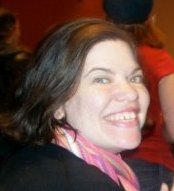 Miriam Posner is the Digital Humanities program coordinator and a member of the core DH faculty at the University of California, Los Angeles. She teaches in the DH program, advises undergraduate and graduate students, and ensures the smooth development of this new interdisciplinary program. Prior to joining UCLA, Posner was a Mellon Postdoctoral Fellow at the Emory University Library’s Digital Scholarship Commons. The author of a number of pieces on digital humanities, Posner also writes on the history of technology, particularly the history of medical imaging. Her book, Depth Perception, on medical filmmaking, is under contract with the University of North Carolina Press.
Miriam Posner is the Digital Humanities program coordinator and a member of the core DH faculty at the University of California, Los Angeles. She teaches in the DH program, advises undergraduate and graduate students, and ensures the smooth development of this new interdisciplinary program. Prior to joining UCLA, Posner was a Mellon Postdoctoral Fellow at the Emory University Library’s Digital Scholarship Commons. The author of a number of pieces on digital humanities, Posner also writes on the history of technology, particularly the history of medical imaging. Her book, Depth Perception, on medical filmmaking, is under contract with the University of North Carolina Press.
Tanya Clement– 3/5/14, 6:30-8:30 : “HiPSTAS, What?: Information Retrieval, Machine Learning, and Visualizations with Sound”
On 26, Feb 2014 | In Events of Interest | By Amanda Licastro
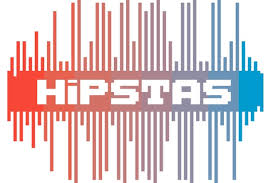 Even digitized, unprocessed sound collections, which hold important cultural artifacts for the humanities such as poetry readings, story telling, speeches, oral histories, and other performances of the spoken word remain largely inaccessible.In order to increase access to recordings of significance to the humanities, Tanya Clement at the University of Texas School of Information in collaboration with David Tcheng and Loretta Auvil at the Illinois Informatics Institute at the University of Illinois, Urbana Champaign have developed the HiPSTAS (High Performance Sound Technologies for Access and Scholarship), which is currently being funded by an NEH Institute for Advanced Topics in the Digital Humanities grant and an NEH Preservation and Access Grant to develop and evaluate a computational system for archivists, librarians, and humanists for discovering and analyzing sound collections. The main premise behind HiPSTAS is that if we don’t use sound collections, we will not preserve. To this end, HiPSTAS has brought together humanists interested in sound scholarship, stewards of sound collections, and computer scientists and technologists versed in computational analytics and visualizations of sound to develop more productive tools for advancing scholarship in spoken text audio. This talk will introduce the project, the participants, and the processes and share early results.
Even digitized, unprocessed sound collections, which hold important cultural artifacts for the humanities such as poetry readings, story telling, speeches, oral histories, and other performances of the spoken word remain largely inaccessible.In order to increase access to recordings of significance to the humanities, Tanya Clement at the University of Texas School of Information in collaboration with David Tcheng and Loretta Auvil at the Illinois Informatics Institute at the University of Illinois, Urbana Champaign have developed the HiPSTAS (High Performance Sound Technologies for Access and Scholarship), which is currently being funded by an NEH Institute for Advanced Topics in the Digital Humanities grant and an NEH Preservation and Access Grant to develop and evaluate a computational system for archivists, librarians, and humanists for discovering and analyzing sound collections. The main premise behind HiPSTAS is that if we don’t use sound collections, we will not preserve. To this end, HiPSTAS has brought together humanists interested in sound scholarship, stewards of sound collections, and computer scientists and technologists versed in computational analytics and visualizations of sound to develop more productive tools for advancing scholarship in spoken text audio. This talk will introduce the project, the participants, and the processes and share early results.
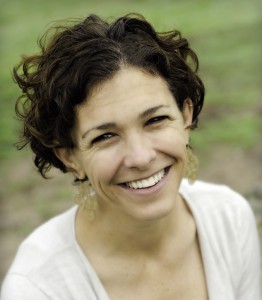 Tanya Clement is an Assistant Professor in the School of Information at the University of Texas at Austin. She has a PhD in English Literature and Language and an MFA in fiction. Her primary area of research centers on scholarly information infrastructure as it impacts academic research, research libraries, and the creation of research tools and resources in the digital humanities. She has published in American Literary History, Digital Humanities Quarterly, Digital Studies / Le champ numérique, Jacket2, the Journal of the Text Encoding Initiative, Library Quarterly, Literary and Linguistic Computing, and Texas Studies in Literature and Language. Some of her digital projects include High Performance Sound Technologies for Access and Scholarship (HiPSTAS) (http://blogs.ischool.utexas.edu/hipstas/), which has received funding from the National Endowment for the Humanities, and ProseVis (http://tclement.ischool.utexas.edu/ProseVis/), which was awarded “Best Infovis” in the 2012 Digital Humanities Awards as part of the NEH-funded “A Thousand Words: Advanced Visualization for the Humanities” project at the Texas Advanced Computing Center (TACC).
Tanya Clement is an Assistant Professor in the School of Information at the University of Texas at Austin. She has a PhD in English Literature and Language and an MFA in fiction. Her primary area of research centers on scholarly information infrastructure as it impacts academic research, research libraries, and the creation of research tools and resources in the digital humanities. She has published in American Literary History, Digital Humanities Quarterly, Digital Studies / Le champ numérique, Jacket2, the Journal of the Text Encoding Initiative, Library Quarterly, Literary and Linguistic Computing, and Texas Studies in Literature and Language. Some of her digital projects include High Performance Sound Technologies for Access and Scholarship (HiPSTAS) (http://blogs.ischool.utexas.edu/hipstas/), which has received funding from the National Endowment for the Humanities, and ProseVis (http://tclement.ischool.utexas.edu/ProseVis/), which was awarded “Best Infovis” in the 2012 Digital Humanities Awards as part of the NEH-funded “A Thousand Words: Advanced Visualization for the Humanities” project at the Texas Advanced Computing Center (TACC).
Announcing the CUNY DHI Spring 2014 Speaker Series
On 26, Feb 2014 | In Uncategorized | By Amanda Licastro
We are pleased to announce our schedule of events for the spring semester at the Graduate Center, CUNY. More information about each event will be posted, so please follow this blog and our twitter feed @cunydhi for updates.
Andrew Stauffer (UVA) – Feb. 19, 6:30-8:30pm in room C205 – “”Postcard from the Volcano: The Research Library after Wide-Scale Digitization.”
Tanya Clement (UT-Austin)– March 5th, 6:30-8:30pm in room C197 – “HiPSTAS, What?: Information Retrieval, Machine Learning, and Visualizations with Sound” (details here).
Doug Rushkoff – March 12th, 3:45pm in room C202 – “Technology as Classroom: the media environment as pedagogy.” Co-Sponsored with the Center for the Humanities.
Miriam Posner (UCLA) – March 27, 6:30-8:30pm in room C202 – A presentation on digital pedagogy. Co-Sponsored by The Fordham Digital Humanities Working Group
Jonathan Hope, “Flatlands: Book History, Literary Criticism, and Hyperdimensional Geometry.” – April 2, 2014, 2pm-4pm, Room 6495 – co-sponsored with the Renaissance Studies Certificate Program.
Around CUNY in 100 Minutes“- Time/Room/Title TBA. If you are a member of the CUNY community and working on a DH project consider showcasing it in a 5 minute “lightning talk.” Please contact us @cunydhi (or email amanda[dot]licastro[at]gmail.com) for details.
Lauren Klein (Georgia Tech)– April 10th, 7pm-9pm (room TBD) – “The Long Arc of Visual Display.”
Ying Zhu and Jason Ng – April 30th, 6:30 PM in room C197 – Chinese Media Censorship. Co-sponsored by The Center for the Humanities; the Interactive Technology and Pedagogy Certificate Program, CUNY Graduate Center; Department of Media Culture, College of Staten Island; CUNY Graduate School of Journalism.
THATCamp Digital Writing – May 2nd at John Jay College, CUNY and May 3rd at Fordham Lincoln Center. Registration opens March 3rd http://digitalwriting2014.thatcamp.org/
DH Praxis Project Launch Event — May 12, 4pm-6pm, Skylight Room, Graduate Center, CUNY
Andrew Stauffer “Postcard from the Volcano: The Research Library after Wide-Scale Digitization,” Wed. 2/19, 6:30-8:30pm
On 13, Feb 2014 | In Uncategorized | By Amanda Licastro
Please join CUNY DHI and the Digital Praxis Seminar for a talk by Andrew Stauffer, “Postcard from the Volcano: The Research Library after Wide-Scale Digitization.”
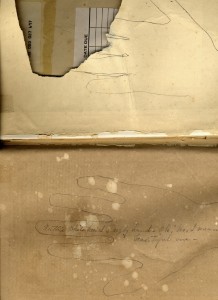 What will become of the print collections? As the historical record is translated to digital forms, academic research libraries are under pressure to manage down their physical holdings and repurpose stack space. In this presentation. I address our need as humanities scholars for a hybrid print-digital environment, one that takes rich advantage of digital technologies even as it finds new ways of seeing individual printed volumes. The 19th-century book — plentiful, out of copyright, often in poor condition — is at particular risk in the coming decade. My conviction is that the vulnerability of this material is bound up with its particular value to our cultural moment, that we are deaccessioning books at precisely the moment when we are most in need of their particular lessons regarding modern media, reading habits,and academic institutions. In this presentation, I focus primarily on personal marginalia in copies of nineteenth-century books, demonstrating the importance of individual copies to our understanding of what books as media – especially books of poetry – were for. In addition, I introduce several initiatives aimed at getting scholars and library policy makers together to chart a course for the future of the print record in our libraries.
What will become of the print collections? As the historical record is translated to digital forms, academic research libraries are under pressure to manage down their physical holdings and repurpose stack space. In this presentation. I address our need as humanities scholars for a hybrid print-digital environment, one that takes rich advantage of digital technologies even as it finds new ways of seeing individual printed volumes. The 19th-century book — plentiful, out of copyright, often in poor condition — is at particular risk in the coming decade. My conviction is that the vulnerability of this material is bound up with its particular value to our cultural moment, that we are deaccessioning books at precisely the moment when we are most in need of their particular lessons regarding modern media, reading habits,and academic institutions. In this presentation, I focus primarily on personal marginalia in copies of nineteenth-century books, demonstrating the importance of individual copies to our understanding of what books as media – especially books of poetry – were for. In addition, I introduce several initiatives aimed at getting scholars and library policy makers together to chart a course for the future of the print record in our libraries.
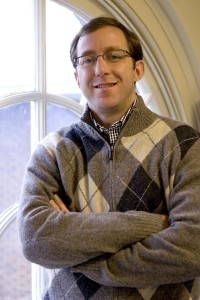 Andrew Stauffer is associate professor of English at the University of Virginia, where he also serves as Director of NINES (Networked Infrastructure for Nineteenth-century Electronic Scholarship) and a member of the teaching faculty of the Rare Book School. He is the author of _Anger, Revolution, and Romanticism_ (Cambridge UP, 2005) and the editor of works by Robert Browning (for Norton) and H. Rider Haggard (for Broadview), and he has published widely on nineteenth-century literature. Stauffer has served as principal investigator on digital humanities grants from Google (for Juxta) and the NEH, and he has received fellowships from the NEH, the ACLS, the Huntington, and the NYPL. His current book project is “Postcard from the Volcano: The Troubled Archive of Nineteenth Century Literature.”
Andrew Stauffer is associate professor of English at the University of Virginia, where he also serves as Director of NINES (Networked Infrastructure for Nineteenth-century Electronic Scholarship) and a member of the teaching faculty of the Rare Book School. He is the author of _Anger, Revolution, and Romanticism_ (Cambridge UP, 2005) and the editor of works by Robert Browning (for Norton) and H. Rider Haggard (for Broadview), and he has published widely on nineteenth-century literature. Stauffer has served as principal investigator on digital humanities grants from Google (for Juxta) and the NEH, and he has received fellowships from the NEH, the ACLS, the Huntington, and the NYPL. His current book project is “Postcard from the Volcano: The Troubled Archive of Nineteenth Century Literature.”
Also, join NYC DH for a #digibar meet-up after this event at The Archive. Updates posted here: http://nycdh.org/groups/digibar/
Simone Browne on Race, Surveillance, and Technology – Mon 12/9, 4:15pm-5:30pm, Skylight Room (9100)
On 26, Nov 2013 | In Events of Interest | By Laura Kane
Please join CUNY DHI and the Digital Praxis Seminar for a talk by Simone Browne on race, surveillance, and technology.
This lecture will be livestreamed at 4:15pm on Dec. 9, 2013
Dark Sousveillance: Surveillance, Race and Resistance
Since its emergence, surveillance studies has been primarily concerned with how and why populations are tracked, profiled, policed, and governed at state borders, in cities, at airports, in public and private spaces, through biometrics, closed-circuit television, identification documents, social media and other technologies. Also of focus are the many ways that those who are often subject to surveillance subvert, adopt, endorse, invite, resist, innovate, limit, comply with and monitor that very surveillance. As an interdisciplinary field of study the questions that shape surveillance studies center on the management of everyday and exceptional life – personal data, privacy, security, and terrorism, for example. While “race” might be a term found in the index of many of the recent edited collections and special journal issues dedicated to the study of surveillance, within the field questions of Blackness remain under-theorized.
Situating Blackness as an absented presence in the field of surveillance studies, this talk questions how the intimate relation between branding and the black body – our biometric past – can allow us to think critically about our biometric present.
About the Speaker
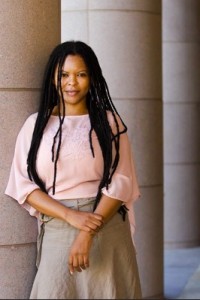 Simone Browne is Assistant Professor in the Department African and African Diaspora Studies at the University of Texas at Austin. She teaches and researches surveillance studies, biometrics, airport protocol, popular culture, digital media and black diaspora studies.
Simone Browne is Assistant Professor in the Department African and African Diaspora Studies at the University of Texas at Austin. She teaches and researches surveillance studies, biometrics, airport protocol, popular culture, digital media and black diaspora studies.
Tom Scheinfeldt, “Making Hay: Lessons in Collaboration from One Week | One Tool ” – Mon 11/25, 4:15pm-5:30pm, Skylight Room (9100)
On 19, Nov 2013 | In Events of Interest | By Laura Kane
Please join CUNY DHI and the Digital Praxis Seminar for a talk by Tom Scheinfeldt on DH Project Management.
Making Hay: Lessons in Collaboration from One Week | One Tool
Digital Humanities projects are rarely blessed with abundant, or even
adequate, resoruces. Staff, skills, equipment, and money are almost
always tight. The experience of One Week | One Tool
(http://oneweekonetool.org), an NEH Institute for Advanced Topics in
Digital Humanties, demonstrates that time and resource constraints can
be made to work in a project’s favor. First in 2010 and again in 2013,
One Week | One Tool brought together a diverse group of academic and
cultural professionals to conceive, plan, build, and launch an open
source software tool in only seven days. Despite, or perhaps because
of, these strict contraints, both groups succeeded in releasing what
have proved to be extremely well-used tools for humanities research:
Anthologize and Serendip-o-matic. This talk will explore some of the
lessons learned from One Week | One Tool for collaboration and project
management in digital humanities and the academic work at large.
About the Speaker
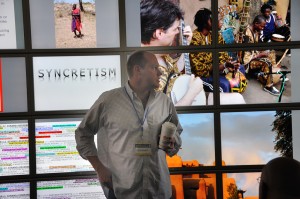 Tom Scheinfeldt is Associate Professor of Digital Media and Design and Director of Digital Humanities in the Digital Media Center at the University of Connecticut. Formerly Managing Director of the Roy Rosenzweig Center for History and New Media at George Mason University, Tom has directed several award-winning digital humanities projects, including THATCamp, Omeka, and the September 11 Digital Archive. Trained as an historian of science and public historian with a bachelor’s degree from Harvard and master’s and doctoral degrees from Oxford, Tom has written and lectured extensively about the history of museums and the role of history in culture. Among his publications, Tom is a recent contributor to Debates in Digital Humanities (University of Minnesota Press) and co-editor of Hacking the Academy (University of Michigan Press). Tom blogs about digital humanities and the business of digital humanities at Found History and co-hosts the Digital Campus podcast will his colleagues Dan Cohen, Amanda French, Mills Kelly, and Stephen Robertson. You can follow Tom on Twitter (@foundhistory) and LinkedIn (http://www.linkedin.com/in/tomscheinfeldt/).
Tom Scheinfeldt is Associate Professor of Digital Media and Design and Director of Digital Humanities in the Digital Media Center at the University of Connecticut. Formerly Managing Director of the Roy Rosenzweig Center for History and New Media at George Mason University, Tom has directed several award-winning digital humanities projects, including THATCamp, Omeka, and the September 11 Digital Archive. Trained as an historian of science and public historian with a bachelor’s degree from Harvard and master’s and doctoral degrees from Oxford, Tom has written and lectured extensively about the history of museums and the role of history in culture. Among his publications, Tom is a recent contributor to Debates in Digital Humanities (University of Minnesota Press) and co-editor of Hacking the Academy (University of Michigan Press). Tom blogs about digital humanities and the business of digital humanities at Found History and co-hosts the Digital Campus podcast will his colleagues Dan Cohen, Amanda French, Mills Kelly, and Stephen Robertson. You can follow Tom on Twitter (@foundhistory) and LinkedIn (http://www.linkedin.com/in/tomscheinfeldt/).

![top-73-censored-weibo[1]_0](https://cunydhi.commons.gc.cuny.edu/files/2014/04/top-73-censored-weibo1_0-300x254.jpg)
 Welcome to the blog of the CUNY DHI, an effort to build momentum and community around Digital Humanities practitioners at CUNY. We hope you'll join us at our upcoming events and that you'll follow this blog to hear about the latest news in the field.
Welcome to the blog of the CUNY DHI, an effort to build momentum and community around Digital Humanities practitioners at CUNY. We hope you'll join us at our upcoming events and that you'll follow this blog to hear about the latest news in the field.



Recent Comments